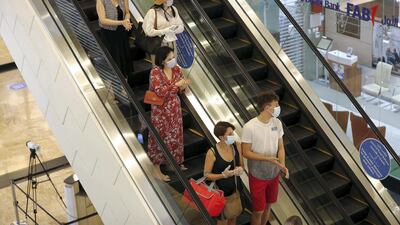Digital transformation will reshape the GCC’s $275.4 billion (Dh1.01tn) retail sector post-pandemic, in turn ‘right-sizing’ a glut and leading to the adoption of artificial intelligence across the industry, according to the UAE’s leading retailers.
“Data will be the new soil – the new engine for growth in the retail sector,” Piyush Chowhan, group chief information officer at Lulu Group International, the region's largest retailer in the GCC, told delegates at a webinar organised by RetailME, a regional retail sector market intelligence provider. “Technology will drive digital initiatives. Good customer experience will come from an innovation mindset, driven using different technology tools."
Prior to the outbreak of the pandemic, retail in the GCC showed strong growth, with fashion and beauty sales projected to grow by $6bn between 2020 and 2023, reaching a market size of $16bn in 2023, according to a July report on the GCC retail sector by CBRE and Roland Berger. However, the sector is also facing challenges due to the high density levels of retail space and the growth in e-commerce.
The retail business is being "right-sized”, said Ashish Panjabi, chief operating officer of Jacky’s Retail & Jacky’s Business Solutions.
"A shrinkage means changes now, but when things get better we will surely rethink how we adapt to growth as we will make use of all available routes to market (online and physical) and maximising our returns on it instead of overexpanding."
The retail market's "massive oversupply" was now being "corrected”, he added.
The Covid-19 pandemic has triggered a global recession that is expected to be the worst since the Great Depression, according to the International Monetary Fund.
A number of retail giants across the world are reporting losses in the wake of movement restrictions imposed by governments to contain the spread of the virus. Major retail brands have been forced to file for bankruptcy in the US including Brooks Brothers, JC Penney, J Crew, Neiman Marcus, Muji USA, Luck Brand, nutritional supplement seller GNC and others.
Retailers are meanwhile initiating a rapid shift to online, embracing technology and integrating artificial intelligence into their operations. The pandemic also means new trends, including contactless checkout, are being expedited across the GCC due to social distancing measures.
Two-thirds of UAE consumers, for example, made their first online grocery purchase due to lockdown measures, according to the Visa CEMEA Impact Tracker.
In Saudi Arabia, Dubai retailer Danube saw a threefold increase in average daily sales through its website and app by the end of March, compared with the previous month.
Meanwhile, Saudi Arabia’s Bin Dawood Group saw online sales triple, according to RetailME.
“Our sector has been highly resilient through the pandemic. During the lockdown, there was huge demand as customers stocked up and prepared food at home. Our online platforms – both BinDawood and Danube Online – saw huge traction, so much so that we had to expand the capacity of operations,” said Waleed Bin Dawood, chief commercial officer, BinDawood Holding.
The region’s retail sector is expected to grow at a compound annual growth rate (CAGR) of 4 per cent reaching $308bn in 2023 from a base of $253.2bn in 2018, according to Dubai-based Alpen Capital.

